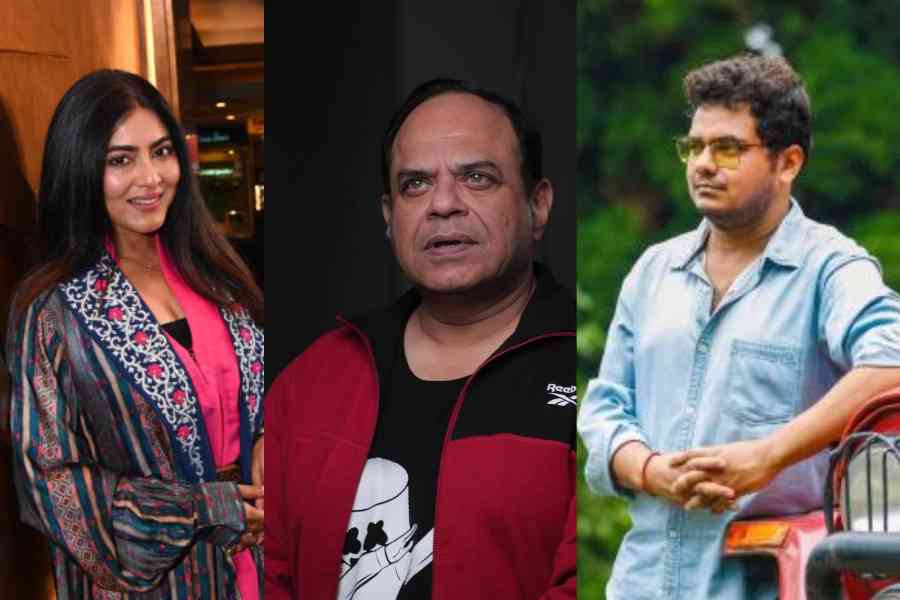Director Saptaswa Basu is busy with the shoot of his new film Balaram Kando in Nainital. The film stars Gargee Roy Chowdhury, Rajatava Dutta, Aishwarya Sen, Apratim Chatterjee, Arya Dasgupta and others. “It’s a story where a mother and father, not on talking terms for 12 years, try to reunite on a singular mission to save their daughter from attempting a serious mistake. The characters will feel organic and the situations will highlight the fun,” said Saptaswa. A t2 chat...
When did you decide to start the shoot of your new film?
We were planning for a thriller. In August, we had an arrangement to visit Nainital for the recce. While scouting the locations, we were convinced that the beautiful and bright heritage spots were appropriate for filming a comedy drama story, titled Balaram Kando, which is written by Apala Chowdhury.
Since the story is a fun-filled, colourful and light-hearted drama, we pitched the one-liner to the producers, Golden Crescent Films and Platinum Pictures, and they readily came forward to team up.
What is the storyline of Balaram Kando?
Balaram Kando pivots on a separated couple, Tarangini Mukherjee and Kishore Sanyal. Tara, a marriage counsellor by profession, is a smart, independent, no-nonsense individual, who by fate falls for a completely opposite-natured individual, Kishore, a mathematics teacher. Their impulsive courtship and marriage decision ended in separation.
Things take a sudden turn when their daughter Avanti, too, walks in the exact steps of her parents by deciding on an impulsive marriage soon after college. The story builds up around the parents coming together after a long 12 years of separation just to team up for the sake of their only daughter.
Why the name Balaram Kando?
It is mainly because the main event in the film takes place in one of the heritage properties of Nainital, the Balarampur House. It is a beautiful bungalow with a huge lawn and space, and we intend to explore our story in this location with the complete madness and chaos that the story has.
Why attempt a comedy-drama?
I have always loved the comedy genre. Be it films of Hrishikesh Mukherjee, Rajkumar Hirani, Priyadarshan, Blake Edwards, Farrelly brothers and so on, I have enjoyed watching the craft behind designing such films that can uplift your spirit in an instant. This is a very difficult genre to handle as right from the script, dialogues and the performances are needed to be precise.
We always talk about the box office success of Bengali films and how it has become restricted to detective films and family dramas. I wanted to break away from the look and feel of these tried genres and also make something different from the films I have presented in the previous years. I finally found the right story and subject to execute comedy on the big screen.
Why did you decide to cast Gargee and Rajatava?
While writing the script, we zeroed in on Gargee Roy Chowdhury and Rajatava Dutta as Tara and Kishore. The energy that Rajatavada presents on screen is incredible and the situational comedy scenes are uplifted by his improvisation. Whereas, Tara is a serious character and Gargee Roy Chowdhury holds the necessary gravity and persona quite well. We are portraying Aishwarya as Avanti, who is just a 19/20-year-old girl, full of life and not afraid to make decisions on her own. Since it is a comedy full of colours, we are showing her through a very vibrant lens.
Who plays who in the film?
Rajatava Dutta plays Kishore and Gargee Roy Chowdhury plays Tarangini aka Tara while Aishwarya Sen plays Avanti, their daughter. Arya Dasgupta and Prosun Saha play Vishal and Rohan, friends of Avanti. Apratim Chatterjee plays Lama, a fun-filled character with bright and dark shades and more can be revealed later about the ensemble.
How is the shooting experience till now?
The shooting experience is amazing. Nainital is a beautiful place. The weather, the people, the food, the ambience, everything is on point. The location itself has such scenic beauty that we tried to capture the natural essence as much as possible.
Not many Bengali films have been shot in this location, so it gives me immense pride to shoot in one of the least explored locations. Coincidently, when the story was being discussed, we stumbled upon a great foreshadowing of our lead character Tara. Nainital, also known as the City of Lakes, holds calm waterbodies in the lap of rigid hills. This is a perfect imagery for Tara. She seems stern but her heart resembles the lakes here. All in all, being in Nainital, shooting at heritage properties, and exploring natural beauty is an experience worth cherishing.
What are you trying to say through the film?
The film distinctively includes two generations. It touches the generation gap, the miscommunication conflicts and the expectation crisis. Every family has interpersonal issues, we intended to highlight one of them. Separation may be a solution to unhappy marriages, but what remains is generally the repentance of not trying a little more, of not expressing as much as needed. We often take our closest ones for granted and the piling of unfulfilled expectations, the unexpressed affections, results in creating an unbridgeable gulf.
When it comes to parents, they try to reiterate their life experiences, but children often turn a deaf ear to the cautions because, for many, they are mere lectures. But maybe that is how the younger generations work. They fail and learn. As kids, we all go through instances where we feel misjudged by our own parents, where we feel our parents do not understand us... they probably do not know us at all, but generally, that’s never the case. Through this film we tend to present the generation gap, the family conflicts and the extent parents go to for the sake of their children.











